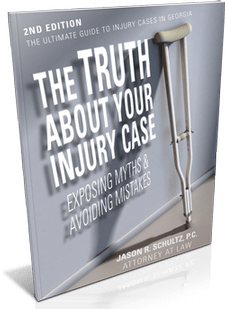Being involved in a car accident is always a stressful experience, but it becomes even more challenging when the driver who hit you flees the scene. You may be left with injuries, expensive property damage, and many questions about what to do next. Our Georgia car accident lawyer is here to help you navigate the aftermath of a hit-and-run crash and seek the compensation you deserve for your damages.
Table of Contents
Common Causes of Hit-and-Run Car Accidents
 A hit-and-run is defined as any traffic collision in which the driver leaves the scene of the wreck. Some frequent causes of hit-and-run accidents include:
A hit-and-run is defined as any traffic collision in which the driver leaves the scene of the wreck. Some frequent causes of hit-and-run accidents include:
- Driving under the influence
- Distracted driving
- Speeding
- Aggressive driving
- Auto part failure
- Road or weather conditions
- Defective traffic signals
Georgia’s Hit-and-Run Laws
In Georgia, it is a crime to leave the scene of an accident. The law requires drivers to stop or return to the scene of the collision, provide necessary information, and render aid to the injured.
Penalties for Hit-and-Run Violations
- Misdemeanor: For accidents without serious injuries, penalties can include fines from $300 to $1,000, up to 12 months imprisonment, and possible license suspension or probation.
- Felony: For accidents with serious or fatal injuries, penalties include imprisonment from one to five years.
Steps to Take After a Hit-and-Run Accident
Collect Information
Note details about the other vehicle and driver, including the color, make, model, and any distinguishing features. Record the time, location, and direction the driver fled. Gather witness contact information.
Contact the Police
File a police report immediately after an accident. Police reports are crucial for insurance claims, as they provide proof of the incident if the at-fault driver or their insurance company disputes that it occurred.
Document the Scene
It is important to thoroughly document the scene of the crash. Take photographs of your damaged vehicle, other damaged property, and any relevant evidence like tire marks.
Notify Your Insurer
After an accident, inform your insurance company and explore recovery options through your policy.
Recovery Options After a Hit-and-Run Accident
Navigating a hit-and-run collision can be daunting. Seeking legal assistance promptly can help you understand your financial recovery options. Here are several avenues through which you can seek compensation.
Identifying the Other Driver
In some instances, law enforcement can track down the driver who fled the scene. If this happens, you can file a claim or lawsuit against the driver. However, many drivers flee because they lack adequate insurance coverage. Our Georgia car accident lawyer can guide you on the best course of action in such situations.
Using Your Own Insurance Policies
- Medical Payments (MedPay) Coverage: MedPay covers hospital and medical costs post-accident, irrespective of fault. This can also extend to dental care and funeral expenses. While Georgia does not mandate MedPay, it is beneficial for covering hefty medical bills if you have it.
- Collision Coverage: This helps pay for vehicle repairs post-accident. Though not required by Georgia law, having collision coverage can significantly ease the financial burden of car repairs.
- Uninsured Motorist (UM) Coverage: With about 10% of Georgia drivers uninsured, uninsured motorist (UM) coverage is crucial. It covers medical expenses, lost wages, and pain and suffering if an uninsured driver causes the accident. If the at-fault driver’s coverage is insufficient, Underinsured Motorist (UIM) coverage can help cover the remaining costs.
- Health Insurance: You should also use your health insurance to cover medical bills.
Types of Damages You Can Recover
You may be entitled to various forms of compensation, including:
- Vehicle repair or replacement costs
- Lost wages or salary
- Medical expenses
- Property damage
- Funeral expenses (in wrongful death cases)
How a Georgia Car Accident Lawyer Can Help
Whether the hit-and-run driver is caught or not, consulting an attorney is crucial if the crash results in serious or fatal injuries. An experienced lawyer can gather evidence, conduct an investigation, and represent your interests, potentially leading to compensation for medical bills, lost wages, pain and suffering, and more. If a loved one is killed, you may also file a wrongful death claim covering medical costs, funeral expenses, and loss of consortium.


